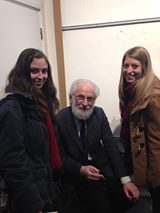
by D. Otway
Wednesday 12th February 2014. The day I met a celebrity. No, I don’t mean Beyoncé – she’s far too busy shaking her behind on TV to come and visit us folk down at the University of Kent. However, I did meet the next best thing: Professor David Crystal.
Yes, Crystal, that linguist famous for books such as Words, Words, Words, The Fight for English and English as a Global Language along with many others. He’s also got quite a reputation for his beard, which makes him look (at least in my books) like a wonderful cross between Jesus and Santa. So when he came to visit our humble campus on 12th February to give a lecture titled ‘Language and the Internet’, Christmas had definitely come early.
On the day, keen linguistics students pour into Grimond lecture theatre. I sit near the front, pen and paper at the ready to scribble down all of the wise man’s words and knowledge in the hope that some of it will rub off on me. Come one o’clock he gets out of his seat and approaches the front of the room. He turns and begins, “So language and the internet. Very new topic, only really developed in the past 10 years. But how can you study something that changes so quickly?” Hang on, I think. Where’s his PowerPoint? Where are his prompts? His YouTube videos that help to explain things for him? Then I realise, this guy isn’t the top dog of linguistics for nothing. This man is a pro.
Normally I have the attention span of a goldfish, but with Crystal, I take in and enjoy everything he has to say. In the hour he has he covers topics such as ‘the emergence of texting and why it isn’t destroying the English language’, ‘language usage in the world of social media (e.g. Twitter)’ and ‘the differences between the internet and traditional spoken and written communication’. Each topic is given with such enthusiasm, and the occasional joke always goes down well. “How many of you have Twitter?” *Half the room raises their hands*. “How many of you have Facebook?” *Whole room raises their hands*. “Why am I not surprised?” he laughs aloud.
The hour passes more quickly than I would have liked, but Crystal isn’t done yet. Question time is next and as I rattle my brain for a great question, my fellow students present theirs. Crystal takes genuine interest in the students’ questions, refraining from brief replies and engaging with all queries posed to him.
Then comes the bit we’re all secretly waiting for. Book signings. “I wonder how many of you are going to stick these on Ebay later?” he says as he gets himself set up. As hordes of students flock to the table with Crystal’s books available to purchase, I head over to the line of dedicated fans who already own some of his work. After a long wait, I get my 30 second chat with him and leave the room happily with my own personal signed book, which is now sitting proudly on my bookshelf.
To people outside the field of linguistics, meeting David Crystal might not seem all that amazing. But to me, it’s definitely been the highlight of my time so far at Kent. Please, come back again soon David?

